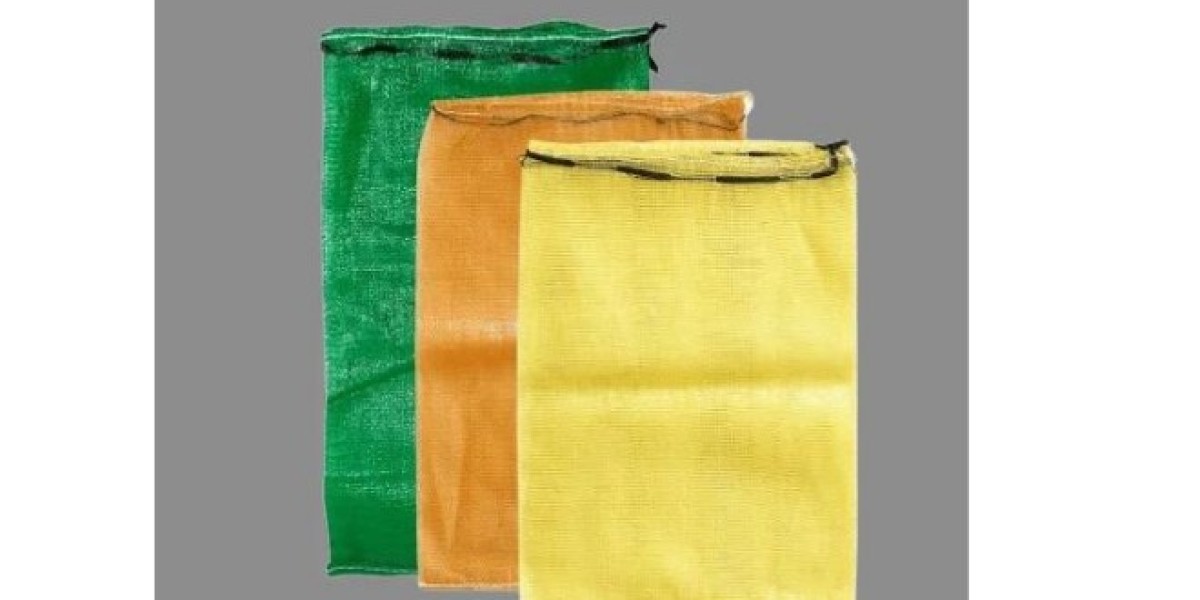Leno mesh bags have become a popular packaging choice across various industries due to their versatility, durability, and eco-friendly qualities. These bags are commonly used for storing and transporting produce, such as onions, potatoes, and citrus fruits, but their applications go far beyond Mahira Polyglobal LLP agricultural products. Constructed from woven polypropylene or polyethylene, leno mesh bags are designed to allow air circulation, keeping perishable goods fresh while reducing the risk of spoilage.
In this post, we’ll explore the advantages of leno mesh bags, their uses, and considerations for choosing the right type of bag for your needs. We’ll also cover some frequently asked questions to help you make an informed choice.
What are Leno Mesh Bags?
Leno Mesh for bags are a type of woven bag made from polypropylene or polyethylene. These bags have a unique mesh structure that allows air to flow freely, providing an ideal storage environment for products that require ventilation. The term "leno" refers to the leno weave construction that offers a high level of strength and durability despite the bag's lightweight and flexible nature.
Leno mesh bags are available in various sizes, colors, and weave patterns, catering to a wide range of applications. The bags are often equipped with drawstrings or closures that make them easy to secure. In addition to being reusable, leno mesh bags are recyclable, making them an environmentally responsible choice for businesses and consumers alike.
Advantages of Leno Mesh Bags
Enhanced Ventilation
- The mesh design of leno bags promotes excellent airflow, keeping the contents fresh and preventing moisture buildup. This feature is particularly beneficial for storing perishable items like fruits, vegetables, and flowers, where air circulation is essential to prolonging shelf life.
Lightweight and Durable
- Leno mesh bags are lightweight yet incredibly durable. They are capable of carrying heavy loads without tearing, making them an efficient and cost-effective packaging solution for various industries. The durability of these bags also makes them reusable, reducing waste and packaging costs over time.
Visibility of Contents
- The semi-transparent nature of leno mesh bags allows for easy identification of the contents. This is advantageous in retail settings, where customers can inspect produce without opening the bag, and in storage situations, where inventory management becomes simpler and more efficient.
Eco-Friendly Option
- Made from recyclable materials, leno mesh bags are a sustainable choice for businesses and consumers aiming to reduce their environmental footprint. Unlike single-use plastic bags, leno bags can be reused multiple times, and at the end of their life cycle, they can be recycled, making them an eco-conscious option.
Cost-Effective
- Due to their lightweight construction, leno mesh bags are economical to produce and transport. Businesses can benefit from lower shipping costs and reduced packaging expenses, particularly in industries where large volumes of packaging are required.
Common Applications of Leno Mesh Bags
Agriculture and Produce Storage
- Leno mesh bags are widely used in the agricultural sector for storing and transporting fresh produce, including onions, potatoes, garlic, citrus fruits, and other perishable goods. The bags' ventilation properties help maintain product freshness, reducing spoilage and extending shelf life.
Retail and Grocery Stores
- In retail and grocery settings, leno mesh bags are used to package fruits, vegetables, and bulk items like nuts. These bags allow customers to see the product, enhancing their shopping experience. Retailers also benefit from the visibility of contents, which aids in quality control.
Flower and Plant Packaging
- Florists and plant nurseries use PP bag manufacturers to package and protect flowers and plants during transportation. The ventilation of these bags helps maintain the quality of the plants and flowers, especially during long-distance shipping or in warm climates.
Industrial and Construction Materials
- Beyond agricultural applications, leno mesh bags are also used to package industrial products such as sand, gravel, and other construction materials. The bags' strength and breathability make them suitable for holding heavy loads, while also allowing the contents to drain if they are wet.
Home and Garden Use
- Home gardeners and DIY enthusiasts use leno mesh bags for storing garden produce, compost, and various tools. The bags are also useful for organizing small items and keeping them in one place, whether in the garden shed, garage, or basement.
Choosing the Right Leno Mesh Bag for Your Needs
When selecting leno mesh bags, it’s important to consider factors like size, strength, and color. Here are some points to help you choose the best bag for your specific requirements:
Size and Capacity
- Choose a bag size based on the volume and weight of the items you need to store. Leno mesh bags are available in a variety of sizes, ranging from small bags for lightweight items to large sacks for bulk storage. Make sure to select a bag with a capacity that suits your needs.
Color Options
- Leno bags come in various colors, including red, green, yellow, and blue. Some colors may be preferred for specific produce types to enhance visual appeal. For example, red bags are often used for onions, while green bags are common for citrus fruits. Color-coding also helps with inventory organization.
Strength and Durability
- Consider the bag’s weight-bearing capacity and durability, especially if you plan to use it for heavy items. Check the bag’s denier (a measurement of thickness) to ensure it is suitable for the load it will carry. High-denier bags are thicker and more durable, making them ideal for bulky and weighty materials.
Additional Features
- Some leno mesh bags come with additional features, such as drawstrings, labels, or closures, to improve convenience and security. Drawstrings, for instance, make it easier to close the bag tightly, while labels can assist with product identification and inventory tracking.
Conclusion
Leno mesh bags are a versatile, eco-friendly solution for packaging, storage, and transportation across multiple industries. From agriculture to retail, and even construction, these bags provide a durable and cost-effective option that supports both functional needs and environmental responsibility. With features like breathability, visibility, and reusability, leno mesh bags cater to a range of applications that benefit from organized, sustainable storage.
Choosing the right Leno mesh bags manufacturer for your specific needs ensures that your products remain fresh, well-organized, and secure. Whether you’re a farmer, retailer, or home gardener, leno mesh bags offer a practical, long-lasting storage solution that’s good for your products—and the planet.
Frequently Asked Questions (FAQs)
1. Are leno mesh bags safe for food storage?
Yes, leno mesh bags are safe for food storage. Made from non-toxic materials like polypropylene and polyethylene, they are free from harmful chemicals that could leach into food. The bags' ventilation and durability make them ideal for storing fresh produce, maintaining freshness, and preventing spoilage.
2. Can leno mesh bags be reused?
Yes, leno mesh bags are designed for reuse. They are durable and can withstand multiple uses, provided they are not subjected to heavy wear and tear. To extend the life of your bags, store them properly when not in use, and avoid exposing them to harsh chemicals or sharp objects.
3. How do I clean leno mesh bags?
Leno mesh bags are easy to clean. Simply shake out any debris, rinse with water, and allow them to air dry. If necessary, use a mild detergent to clean them thoroughly. Avoid using harsh chemicals, as they could weaken the material over time.
4. Are leno mesh bags environmentally friendly?
Yes, leno mesh bags are environmentally friendly because they are reusable and recyclable. Unlike single-use plastic bags, leno mesh bags can be used multiple times before disposal, and when they reach the end of their life cycle, they can be recycled, reducing their environmental impact.












